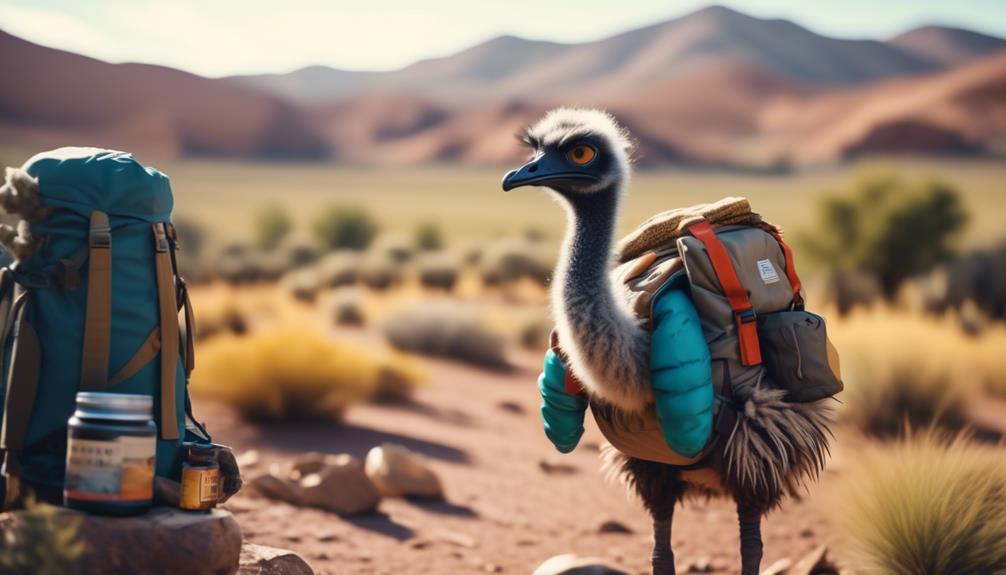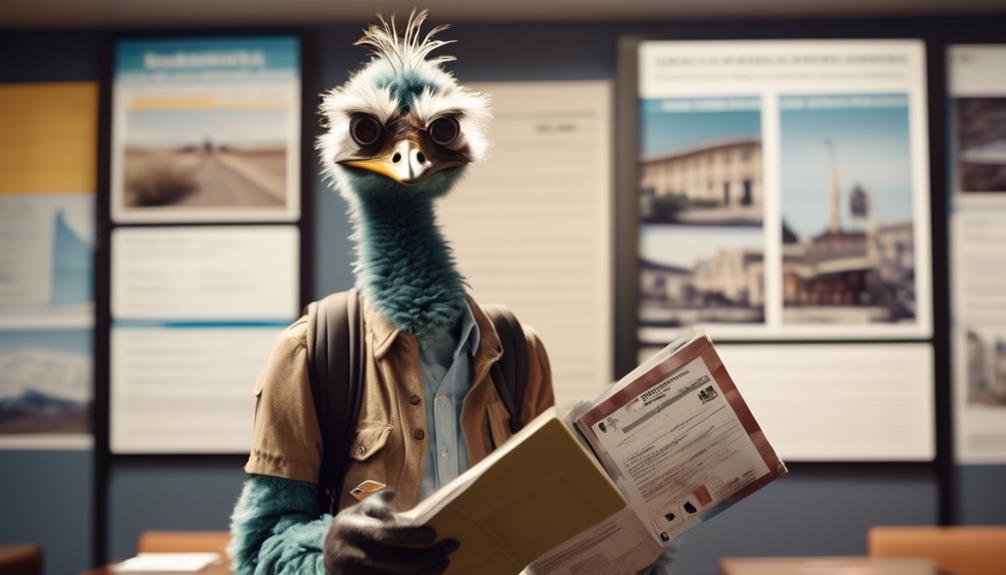
Did you know that the number of people traveling with emus has been steadily increasing over the past decade? If you're considering embarking on a journey with these fascinating creatures, it's important to be well-prepared.
From researching their behavior and needs to understanding legal requirements, there's a lot to consider. In this discussion, we will explore the essential steps and tips for traveling with emus, ensuring their safety, comfort, and well-being throughout the journey.
So, whether you're a seasoned emu traveler or new to the experience, get ready to discover the secrets of successful emu adventures.
Key Takeaways
- Thoroughly research emu behavior, social needs, and personalities before traveling with them.
- Ensure suitable accommodations and transportation for emus, including secure enclosures and proper travel carriers.
- Pack necessary supplies and equipment, including lightweight travel gear, emergency medical supplies, and cleaning supplies.
- Meet emus' dietary and exercise needs by providing a well-balanced diet, regular stops for exercise, and access to a sandy area for dust bathing.
Researching Emu Behavior and Needs
To ensure a smooth and enjoyable journey with your emus, it's crucial to thoroughly research their behavior and needs prior to embarking on your travels. Emus are fascinating creatures with their own unique personalities and quirks. Understanding their behavior and social needs won't only make your journey more pleasant but also contribute to the overall well-being of your emus.
Emu training is an essential part of preparing for travel. Emus can be taught basic commands such as 'stay,' 'come,' and 'heel.' This not only helps with managing your emus in public spaces but also ensures their safety and the safety of those around them. Training sessions should be short, frequent, and use positive reinforcement techniques.
In addition to training, emu socialization is vital for their mental and emotional well-being. Emus are highly social animals, and they thrive when they've opportunities to interact with other emus. Before embarking on your journey, make sure your emus have had ample time to socialize with others of their kind. This can be done by arranging playdates with other emu owners or by visiting emu farms or sanctuaries.
Planning Suitable Accommodations
Now that you have a solid understanding of emu behavior and socialization, it's time to focus on planning suitable accommodations for your emus during your travels. Providing a comfortable and safe environment for your feathered friends is crucial to ensure a stress-free journey.
Here are some tips to help you plan the perfect accommodations for your emus:
- Finding emu friendly activities: When choosing your accommodations, look for places that offer activities suitable for emus. Emus are curious creatures and enjoy exploring their surroundings. Opt for locations that have spacious outdoor areas where your emus can roam and graze freely. Additionally, consider finding accommodations near nature reserves or wildlife sanctuaries that allow emus.
- Choosing the right travel companions: Emus are social animals and thrive in the company of their kind. It's essential to ensure that your emus have suitable travel companions during your trip. If you have multiple emus, it's best to keep them together in the same enclosure to prevent loneliness and anxiety. However, if you only have one emu, consider finding opportunities for them to interact with other emus, such as visiting emu farms or attending emu gatherings.
- Providing secure enclosures: Emus are excellent jumpers and can easily clear fences that aren't tall enough. When selecting accommodations, choose ones with secure enclosures that have high fences or barriers to prevent your emus from escaping. Additionally, ensure that the enclosure is free from any potential hazards such as sharp objects or toxic plants.
- Ensuring proper ventilation and cleanliness: Emus require a clean and well-ventilated environment to thrive. When booking accommodations, inquire about the cleanliness protocols and ventilation systems in place. Emus are sensitive to dust and can develop respiratory issues if exposed to poor air quality. It's essential to choose accommodations that prioritize cleanliness and provide adequate ventilation for your emus' well-being.
Ensuring Proper Transportation Safety

Ensuring the safety of your emus during transportation is vital for a smooth and secure journey. When it comes to transporting your emus, it is important to use proper emu travel carriers. These carriers are specifically designed to provide a safe and comfortable environment for your emus while on the move.
To secure your emus during transportation, it is crucial to ensure that they are properly restrained within the carrier. Emus are large and powerful birds, so it is important to use strong and secure fastenings. Make sure that the carrier has sturdy latches and locks to prevent any accidental openings during transit.
To make it easier for you to understand the different options available for emu travel carriers, take a look at the table below:
| Carrier Type | Description |
|---|---|
| Crate | A solid and durable carrier made of strong materials such as plastic or metal. It provides excellent protection and ventilation for your emus. |
| Trailer | A larger carrier that can accommodate multiple emus. It is equipped with ramps for easy loading and unloading. |
| Box truck | A spacious carrier with adjustable compartments. It allows for easy movement and comfort for your emus during long journeys. |
Packing Essential Supplies and Equipment
When preparing for your emu travel, it's crucial to pack essential supplies and equipment to ensure a smooth and successful journey. Here are some items that you shouldn't forget to bring:
- Lightweight travel gear: Emus can be quite large and require a lot of space, so it's important to pack lightweight and compact travel gear. Opt for collapsible bowls, portable water bottles, and foldable food containers to save space in your bag.
- Emergency medical supplies: While we hope for the best, it's always better to be prepared for any unforeseen circumstances. Pack a first aid kit with essentials like bandages, antiseptic wipes, and pain relievers. Additionally, include any necessary medications for you and your emu, along with a copy of their medical records.
- Protective gear: Emus have sharp claws and beaks, so it's essential to have protective gear to handle them safely. Pack sturdy gloves that offer good grip and protection for your hands. You may also want to consider a face shield or goggles to protect your face from any accidental scratches or pecks.
- Cleaning supplies: Emus can be messy creatures, so it's important to bring cleaning supplies to maintain hygiene during your journey. Pack disinfectant wipes, poop bags, and a small broom and dustpan to keep your surroundings clean and tidy.
Understanding Legal and Permit Requirements

As you continue your preparations for traveling with emus, it is important to familiarize yourself with the legal and permit requirements associated with transporting these unique creatures. Understanding quarantine regulations and obtaining veterinary certificates are crucial steps in ensuring a smooth and legal journey with your emus.
Quarantine regulations vary from country to country, and even within different states or provinces. These regulations are in place to prevent the spread of diseases and protect the local flora and fauna. It is essential to research and comply with the specific quarantine requirements of your destination, as failure to do so can result in fines, penalties, or even confiscation of your emus.
Obtaining veterinary certificates is another important aspect of meeting legal requirements. These certificates confirm that your emus are healthy and free from any contagious diseases. You will need to schedule a visit with a veterinarian who is experienced in working with exotic animals, such as emus. The veterinarian will conduct a thorough examination and provide the necessary documentation to prove the health status of your emus.
To provide a clearer picture of the legal and permit requirements, take a look at the table below:
| Country/State/Province | Quarantine Regulations | Veterinary Certificate Requirements |
|---|---|---|
| United States | Varies by state | Required |
| Canada | Varies by province | Required |
| Australia | Strict | Required |
| United Kingdom | Strict | Required |
Managing Emu Health and Well-being
Taking proactive measures to maintain the health and well-being of your emus is essential for a successful and enjoyable journey.
Emus have specific dietary requirements that must be met to ensure their optimal health. Here are some important considerations to keep in mind:
- Dietary Requirements: Emus are herbivores and their diet primarily consists of plants, fruits, and vegetables. It's crucial to provide a well-balanced diet that includes a variety of fresh greens, such as lettuce, spinach, and kale. Additionally, emus require a source of protein, which can be provided through specially formulated emu pellets or insects like mealworms. It's important to consult with a veterinarian or an emu specialist to create a suitable diet plan for your emus.
- Exercise Needs: Emus are naturally active birds that require ample space to roam and exercise. When traveling, it's important to provide them with opportunities to stretch their legs and engage in physical activity. Make sure to schedule regular stops during your journey to allow your emus to walk around and explore their surroundings. Emus also enjoy dust bathing, so providing them with access to a sandy area during stops can help promote their well-being.
Frequently Asked Questions
Can Emus Be Trained to Perform Tricks or Follow Commands?
Yes, emus can be trained to perform tricks and follow commands. Emu training techniques involve positive reinforcement and consistency. They can also be used as therapy animals, providing comfort and companionship.
Are There Any Restrictions on Traveling With Emus in Certain Countries or Regions?
You'll want to do your research before taking your emu on a trip, as there can be restrictions on traveling with them in certain countries or regions. Documentation requirements may vary, so be prepared.
Are There Any Specific Dietary Requirements or Restrictions for Emus While Traveling?
When traveling with emus, it's important to consider their dietary requirements. Emus need a balanced diet of fruits, vegetables, and high-quality protein. Be mindful of any allergies or restrictions they may have. Proper nutrition is key to their well-being and behavior during the journey.
How Should Emus Be Introduced to New Environments or Unfamiliar Surroundings During Travel?
When introducing emus to new environments or unfamiliar surroundings during travel, it's important to do so gradually. Start by exposing them to small, controlled areas before gradually expanding their space. This helps them acclimate and reduces stress.
What Is the Average Lifespan of an Emu and How Does Traveling Affect Their Overall Health and Well-Being?
The average lifespan of an emu is around 10 to 20 years. When traveling, it's important to consider how it can impact their overall health and well-being. Emus require proper care and attention to ensure their safety and comfort during journeys.
Conclusion
In conclusion, embarking on a journey with emus requires diligent preparation and a deep understanding of their unique needs.
Like a seasoned explorer navigating uncharted territories, one must research their behavior, secure suitable accommodations, ensure safe transportation, and pack essential supplies.
Additionally, it's vital to adhere to legal and permit requirements while prioritizing the health and well-being of these magnificent creatures.
With meticulous planning and a metaphorical compass in hand, you can embark on an unforgettable adventure with your emu companions.




